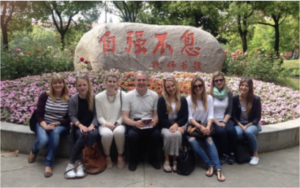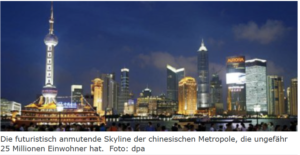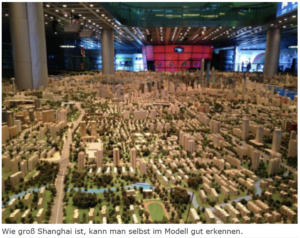Cologne students in the Campus Village of the Mega City
Fresenius University has signed a cooperation agreement with Shanghai University. Eight students from Cologne were allowed to visit the university in the metropolis.
25 million inhabitants, 3000 high-rise buildings and the fastest train in the world, a Transrapid. Shanghai is a city of superlatives. For ten days, eight students from Fresenius University had time to get to know Asia’s metropolis on an excursion. Under the guidance of Richard C. Geibel, Dean of Studies and head of the Master’s program in Media Management & Entrepreneurship, they strolled along the harbor promenade, where flying merchants sell watches, toys and postcards, climbed the 468-meter Oriental Pearl Tower, which is illuminated at night with pink balls, and attended a traditional tea ceremony.
 The focus of the excursion was of course a visit to Shanghai University, which according to some experts is one of the best universities in the world. Many of the 38,000 students come from the Chinese provinces and, because they cannot afford the expensive apartments in Shanghai, live in student dormitories directly on campus, says student Kathinka Telesio. In the meantime, a real small town with cafés, shops and kiosks has developed there. The seminars that the German students attended, however, had nothing of a mass university. They were presented with courses in which a maximum of 30 prospective academics were taught by one professor. “It was incredibly quiet in the seminar,” Telesio recalls, because it is considered impolite among Chinese students to be loud in the presence of a lecturer.
The focus of the excursion was of course a visit to Shanghai University, which according to some experts is one of the best universities in the world. Many of the 38,000 students come from the Chinese provinces and, because they cannot afford the expensive apartments in Shanghai, live in student dormitories directly on campus, says student Kathinka Telesio. In the meantime, a real small town with cafés, shops and kiosks has developed there. The seminars that the German students attended, however, had nothing of a mass university. They were presented with courses in which a maximum of 30 prospective academics were taught by one professor. “It was incredibly quiet in the seminar,” Telesio recalls, because it is considered impolite among Chinese students to be loud in the presence of a lecturer.
Visit to Volkswagen
The German students’ timetable included not only lectures such as “Business Culture in China”, “China in Economic Change” and “Industrial Logistics”, but also visits to companies. At Volkswagen Shanghai, the students were able to watch a VW Tiguan being assembled, and at the Chinese Shanghai Tunneling Engineering Company, they were able to see how large shafts are built, for example for the Shanghai underground railway. The company has dug an estimated 90 percent of all tunnels in the city.
Excursion leader Geibel is fascinated by the flexibility of the Chinese. “They have an incredible willingness to innovate,” he says. “What takes us 15 years, happens in China in one.”
That much innovative power is probably also urgently needed in a city that has had to create the infrastructure for eight million additional inhabitants in recent years. where huge piles of garbage are created and smog makes it difficult for residents to breathe. Where migrant workers meet the sophisticated middle class and the gap between rich and poor is wide. Nevertheless, Cologne’s students have fond memories of the mega-city: No chaos in the subway, few traffic jams on the streets, hardly any visible poverty.
“From what we could see on site, almost everything was well organized,” says Charlotte Lennardt, who studies urban planning at the Fresenius University of Applied Sciences. The only thing that irritated the German students was the large number of Chinese people who wanted to take pictures of them. “Apparently, European tourists are an attraction in Shanghai.” In the future, the Fresenius University of Applied Sciences wants to work more closely with Shanghai University. During his visit to the Chinese metropolis, lecturer Geibel signed a cooperation agreement. This will enable Cologne lecturers to teach in Shanghai and Chinese professors to teach at Fresenius University in the future. “We urgently need more diversity,” says Geibel. In a globalized world, he says, one cannot look at things from a German perspective alone.
article: Kölner Stadt Anzeiger 21.06.2015
Author: Dirk Riße

